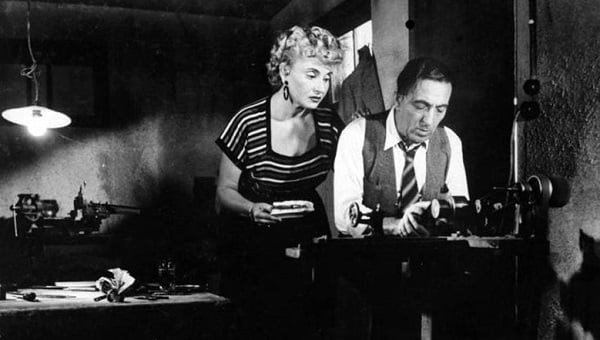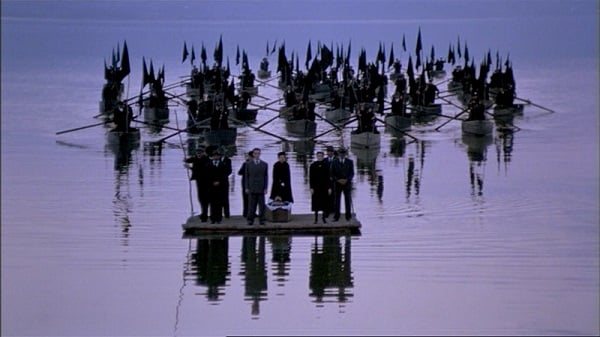The 15 Best Greek Movies of All Time

The uprising of Greek cinematography dates somewhere back to the 1950s when it started to flourish and some of its movies from that time gained cult status among movie lovers. The sixties only proved their filmmakers’ talent, with Alexis Zorbas as one of their most famous movies of all time.
But modern Greek cinematography also has a lot to offer and even though there are more movies before the 2000s we are going to mention here, it has to be emphasized that there will certainly be something to look forward to in their future moviemaking. This is the list of the 15 best Greek movies of all time.
Stella (1955)

One of the most influential Greek movies of all time, a true classic, beloved among many who. It is a story about a singing diva, the fierce and independent Stella, an entertainer in a small nightclub, but firstly and foremostly a woman who cherishes and loves her freedom.
She makes a promise to herself, never to trust and give herself to a man, but she changes her mind when she meets the egoistic and explosive football player Miltos who sweeps her off her feet. Stella has never belonged to a man and Miltos expects everything, her total surrender. But is Stella willing to change everything she ever said and become a loving woman, devoted to one man? Or is this passionate story going to end in a tragic way?
Istoria mias kalpikis liras (The Counterfeit Coin, 1955)

This romantic comedy-drama tells the story of a clandestine workshop that belongs to Anargyros, an honest and hardworking goldsmith and engraver who invests his money in gold coins. He soon becomes an offer to start minting counterfeit sovereigns, but he refuses. Until he meets an attractive lady who makes him change his mind by using sexual means.
Even though Anargyros, his lady and the man who offered him this deal manage to mint their first coins, people soon begin to figure out this is not real money, since he is having a hard time accepting it as currency. And a series of misfortunes will make Anargyros give up on this deceit. Will he be able to continue as before?
O Drakos (1956)

New Year’s Eve in the mid-1950s’ Athens is right on the corner and Thomas, a reclusive bank clerk finds out that he strikes a great resemblance with the notorious criminal who is terrorizing the city. This presents another burden in his already complicated life so he decides to lay low in one of the city’s shady cabarets.
He meets various individuals there and among them also a gang of thieves with their leader Thanos who are all in for the unexpected. Thomas will become someone he never imagined to be, known as the dragon, which will put him in dangerous situations, especially when everyone finds out he is not the one they thought he was.
This movie made a huge success after its release due to its interesting and current topic and the way it is portrayed. It satirises the film noir genre and deals with the always attractive and intriguing question of the alienation of a common man.
Tis kakomoiras (World Gone Mad, 1963)

This is a love story about two men, Zikos, the outspoken assistant in a grocery store and his boss, Mr Pandelis, who unexpectedly fall in love with their new neighbours. They hope they are finally going to settle down and begin to make plans for their future, but they are not remotely aware that their neighbours are not at all interested in them.
Still believing in happily ever after, Zikos and Pandelis’s dreams are crushed when their neighbours’ true sweethearts appear at a party all of them attend one night.
Alexis Zorbas (Zorba the Greek, 1964)

Probably the most famous Greek movie of all time, an Academy Award winner in the categories for the best-supporting actress, best cinematography and best art direction and is especially known for the iconic performance by Anthony Quinn. It tells the story of a British-Greek writer Basil who is travelling to Crete. While waiting for his boat to arrive he meets the enthusiastic Greek-Macedonian pheasant and musician Zorba.
Zorba persuades him to take him and when they arrive in Crete, their journey of friendship and other connections begins. Zorba has a great lust for life and he has a lot of influence on Basil who soon begins to realise that his views on life are starting to change rapidly.
Ta Kokkina Fanaria (The Red Lanterns, 1963)

This drama was nominated for the Academy Award for Best Foreign Language Film. It follows the story of Eleni and her friends who work as prostitutes in their secret workplace: The Red Lanterns. Each of them has its own background and story. Eleni is one of the most famous prostitutes there who has made some wrong choices after arriving in Greece from Romania.
Ana, Marina and Mary are her best friends, both of them with their own issues and soon they welcome another girl, the 16-year-old Myrsine. Since this part of Athens is about to be modernised, their brothel is facing closure and we are going to get to know all of them more personally, including their shattered dreams and hopes for a better future.
Rembetiko (1983)

This movie is inspired by the true story of a legendary Rebetico singer Marika Ninou. It tells the tragic story of this talented singer from her birth in Smyrna in 1917 until her death in 1955 in Athens. We learn a lot about Marika, from her early days in the Athens port of Piraeus to her relationship with her mentor Babis.
We will follow her to America and witness her great successes in their nightclubs and finally see what caused her early demis back in Athens. Along with her destiny, we also get a glimpse of the sociopolitical situation of the time and historical events around Marika’s life.
Taxidi sta Kythira (Voyage to Cythera, 1984)

This movie was a great hit when it got out in 1984 and it won numerous awards including the one for the best screenplay at the Cannes film festival. It shows the perspective of a person who didn’t spend some time in his homeland and how one’s expectations can change after many years have gone by.
The story follows an ex-communist who returns to Greece after decades of exile in the Soviet Union. Spyros only wants to come home to his family and friends and we get to know him during his attempt to arrive on the island of Cythera. Spyros is much older now, frustrated and doesn’t want to speak about his past and at the same time is wondering about his native country and the changes there.
Mia aioniotita kai mia mera (Eternity and a Day, 1998)

This well known Greek movie is also one of the most successful, with its stellar cast and numerous awards. Alexandros is a middle-aged man who finds out he has a terminal disease and decides to get his affairs in order, say goodbye to his loved ones and join his late wife. He recalls his younger days and is getting ready to die, but after an unexpected event, he will have to put that on hold.
He saves an Albanian immigrant from being arrested and later that day witnesses his kidnapping. He decides to follow the criminals and ultimately saves the young boy. He will learn a lot about the boy, whom he feels connected through fear. His is about the future that lies in front of him and the boy’s is about the dangerous path back to his homeland Albania.
Trilogia: To livadi pou dakryzei (Trilogy: The Weeping Meadow, 2004)

This movie is the first in the trilogy about some recent events in Greek history, followed by the sequel The Dust of Time. Unfortunately, it wasn’t finished due to the director’s unexpected death in 2012. It is a story about the historical events in Greece from 1919 to the aftermath of World War II, through the life of one family.
An orphaned girl named Eleni is the centre of the story. She gets adopted when a group of refugees returns to Greece after the Russian Revolution. We follow her story through adolescence and marriage to her adoptive brother. Future events will form their lives which will, unfortunately, be anything but pleasant and nice.
Mikra Anglia (Little England, 2013)

This period drama is an epic tale of love and lies told through the stories of two sisters and one man. The twenty-year-old Orsa falls madly in love with the lieutenant Spyros, but she keeps it a secret. Her little sister Moscha is completely opposite of her, loud and energetic and dreams of a life far away from theirs on the island of Andros.
But their mother Mina has some other plans for her daughters and decides to marry them according to interest. Orsa is to be wed to a marine and captain Nikos and later Moscha to Spyros who is now captain. Their house is now divided into two parts and what was until then a nice sisterly relationship will be ruined by the existence of forbidden love.
Glykia symmoria (Sweet Bunch, 1983)

This is an experimental underground art movie which gained a lot of praise and positive reactions when it got out. It is a story of a group of four misfits, Argyris, Andreas, Marina and Sofia who share the same house. All of them completely lost any reason to live and are spending their days performing different criminal activities.
Some of them don’t pay at expensive restaurants, and some shoplift or star in pornographic movies. They are put under surveillance by the authorities who are only waiting for a false step so they can arrest them. The first occurs when Sofia kills the police officer who is in charge of monitoring their home.
O Thiasos (The Travelling Players, 1975)

This movie masterpiece is a historical drama that depicts the period in the mid 20th century Greece between 1939 to 1952. It follows a group of travelling players who are putting on a play. The first part is oriented to their rehearsals and performing of the play and the second deals with their views of the communities they visit.
They experience Metaxas’ dictatorship, the war against the Italians, the Nazu occupation, the liberation and finally the civil war. And in the end, we learn more about their personal issues, including betrayals and jealousy.
To vlemma tou Odyssea (Ulysses’ Gaze, 1995)

This interesting movie talks about a successful Greek moviemaker, A., who returns to Greece to take part in a screening of one of his earliest movies. He also wants to make a personal journey through the Balkans. He will set out on this journey in order to find the roots of the cinema and the Balkan identity.
His odyssey and self-discovery end in war besieged Sarajevo where he meets Levy, the curator of a local cinema. His journey ends with Levy and a tragedy that awaits him and his family.
To meteoro vima tou pelargou (The Suspended Step of the Stork, 1991)

This romantic drama tells the story of Alexandre, a TV reporter who is sent to a border town where a lot of immigrants from Albania, Turkey and Kazahstan found their refuge. Among all of them, he notices an old man who he recognises as one of the most important Greek politicians who mysteriously disappeared a few years ago.
After these few days of work there, he comes back to Athens where he finds the politician’s wife and asks her to go and identify him. This is where we learn how the immigrants are treated at the borders and face the inhumanity they are faced with every day.

